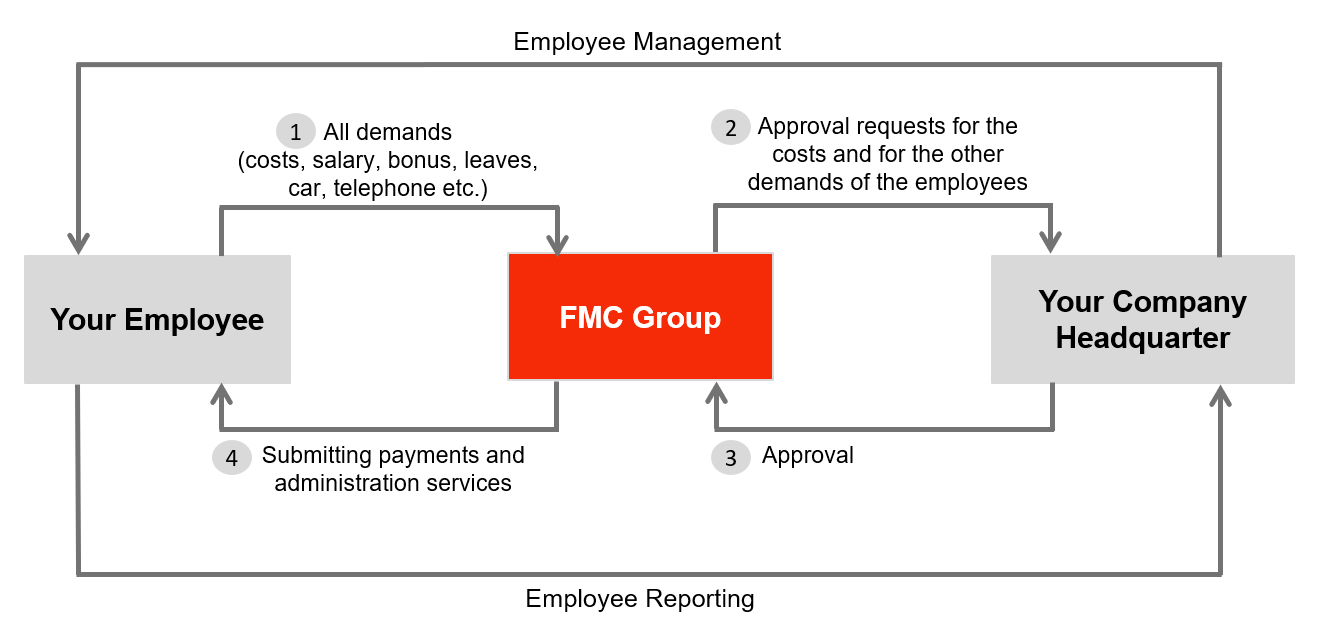
Employer of Record Singapore
Our Employer of Record in Singapore service enables clients to hire employees without the need to operate a local legal entity there.
It makes a big difference to develop a new market with your own personnel on the ground. Particularly for functions related to sales & marketing, business development, distributor management, and service & maintenance, our customers are very satisfied using our Singapore Employer of Record Service.
Our customers and their local teams can be free of the distractions of administrative tasks and complex local requirements. So you can fully focus on the development of your core business.
If your local business grows large enough, you can easily transfer the employees to your own subsidiary. It also provides a quick exit strategy if necessary. In addition to Singapore, we offer Employer of Record services in other several countries.
Content:
- Employer of Record Singapore – FMC Group’s Approach
- Hiring an Employee
- Typical Benefits
- Visa for the Employees
- Time off Policies
- Terminating an Employee

Get in touch with us

Employer of Record Singapore - FMC Group's Approach
- Quick, flexible, and easy entry into Singapore in compliance with local employment laws
- Complete control over business development with your own team
- Good option for building up, managing, and supporting your distributors and key accounts by directly observing local developments and adjusting the strategy whenever necessary
- Using our comprehensive recruitment experience for international clients, we can form a local team that fits your corporate culture.
- Focusing on your core business instead of dealing with the time-consuming and complex local administrative tasks
- Allowing for easy market exit if necessary
- Integrating your employees into our team through motivational events and special meetings
EOR Singapore Management & Reporting Flow

Hiring an Employee
For hiring in Singapore, it is recommended that employers create a robust, written contract that explicitly outlines important terms of employment. This should encompass the job description, the responsibilities of the employee, as well as the salary and benefits associated with the position.
Regarding letters of offer and employment contracts, both documents should consistently specify compensation figures in Singapore dollars (SGD)
Employment Contract – indefinite vs. fixed term
In Singapore, typical employment agreements are structured as indefinite-term contracts, wherein the employment relationship remains open-ended and continues until either party chooses to end it. These indefinite-term contracts can encompass both full-time and part-time employment arrangements.
Fixed-term contracts are allowed in Singapore, although they are not commonly utilized. There are no specific legal regulations dictating the duration of such contracts. However, when employing fixed-term contracts lasting less than three months, certain benefits like annual leave and sick leave may be limited. It is advisable, as a best practice, to provide fixed-term contracts with a minimum duration of one year.
Probation Period
There is no specific legal mandate regarding the duration of probationary periods. Nevertheless, it is customary to establish a probation period lasting from 3 to 6 months, during which the notice period is typically shorter.
Work Week, Overtime & Maximum Working Hours
The Employment Act of 1968, often referred to as the Employment Act, serves as Singapore’s primary labor legislation, setting out fundamental employment terms and working conditions for various categories of workers, encompassing part-time, contractual, and temporary employees. It is applicable to both Singaporean citizens and foreign workers within Singapore.
However, it’s worth noting that specific provisions of the Employment Act, like those pertaining to working hours and rest days, are not applicable to employees holding managerial or executive positions. Instead, these provisions are designed for “workmen,” which typically refers to employees engaged in manual labor.
When it comes to working hours in Singapore, employees are expected to work between 40-44 hours per week.
Income Tax
In Singapore, the Central Provident Fund (CPF) serves as the primary national social security scheme. While the specific CPF contribution rate can differ, employers are recommended to allocate 17% of the employee’s salary as an additional expense on top of the regular salary. This 17% represents the employer’s contribution to the CPF fund. It’s important to note that there are no monthly employee, employer, or payroll tax contributions required in Singapore for this purpose.
Typical Benefits
- In managing benefits in Singapore, employers should distinguish between mandatory benefits mandated by law and those provided as supplementary offerings.
- All employees in Singapore receive basic health insurance through the national system. However, employers have the flexibility to provide additional health benefits. It is a common practice in Singapore for employers to extend supplementary health and life insurance to their employees. Alternatively, some employers opt to grant a small allowance that employees can use to acquire supplemental insurance.
- When drafting employee contracts, it’s essential to take into account any extra benefits, such as additional sick leave, maternity leave, vacation leave, or a housing allowance, that the employer intends to provide beyond the mandatory offerings.
- When it comes to work bonuses, similar to practices in both China and Hong Kong, Singapore often provides employees with a 13th month bonus, also known as an annual bonus. In the case of sales employees, this bonus may be substituted with commission payments. In periods of economic prosperity in Singapore, an annual bonus can amount to as much as two to three times an employee’s annual salary.
Visa for the Employees
Foreign workers in Singapore are obligated to possess the appropriate visas and work permits as mandated by immigration regulations. The most prevalent type of work permit is the Employment Pass, which is applicable to foreign workers who meet the eligibility criteria, including earning a minimum monthly salary of SGD 3,300.
Time off Policies
Public Holidays
Here are the dates for the 11 gazetted public holidays in 2024:
- New Year’s Day – January 1, 2024 (Monday)
- Chinese New Year – January 22, 2024 (Monday) and January 23, 2024 (Tuesday)
- Good Friday – April 5, 2024 (Friday)
- Labor Day – May 1, 2024 (Wednesday)
- Vesak Day – May 17, 2024 (Friday)
- Hari Raya Puasa (Eid al-Fitr) – May 27, 2024 (Monday)
- National Day – August 9, 2024 (Friday)
- Hari Raya Haji (Eid al-Adha) – August 15, 2024 (Thursday)
- Deepavali – October 24, 2024 (Thursday)
- Christmas Day – December 25, 2024 (Wednesday)
Annual Leave
Paid time off ranges from 7 to 14 days, depending on an employee’s tenure, and includes bank holidays.
Other Leave Types
- Maternity Leave for Mothers:A paid maternity leave is for 16 weeks. During the initial two pregnancies, the employer covers the initial 8 weeks of maternity leave, while the government assumes responsibility for the subsequent 8 weeks. However, for any subsequent pregnancies, the government covers the entire duration of maternity leave.It’s important to note that employees with less than 3 months of service do not qualify for paid maternity leave.
- Paternity Leave for Fathers: Paternity leave is provided for a duration of 2 weeks.
Sick Leave
Sick leave varies from 5 to 60 days and is determined by an employee’s tenure as well as the necessity for hospitalization.
Terminating an Employee
In Singapore, employment contracts commonly include a probation period lasting from three to six months. During this probationary period, a shorter notice period is typically agreed upon, although it’s not legally mandated. The typical notice period agreed upon is one month for both the employee and the employer. However, this isn’t a strict rule applicable to all employment arrangements.
In cases where the employment contract doesn’t specify a notice period, standard notice periods come into play. For employees with less than 26 weeks of employment, the notice period is one day. This notice period increases to one week for employees with between 26 weeks and two years of employment and two weeks for those with employment lasting between two and five years. When employment spans more than five years, both parties are required to provide four weeks’ notice.
Disclaimer: Although we carefully researched and compiled the above information, we do not give any guarantee with respect to the actuality, correctness, and completeness.
